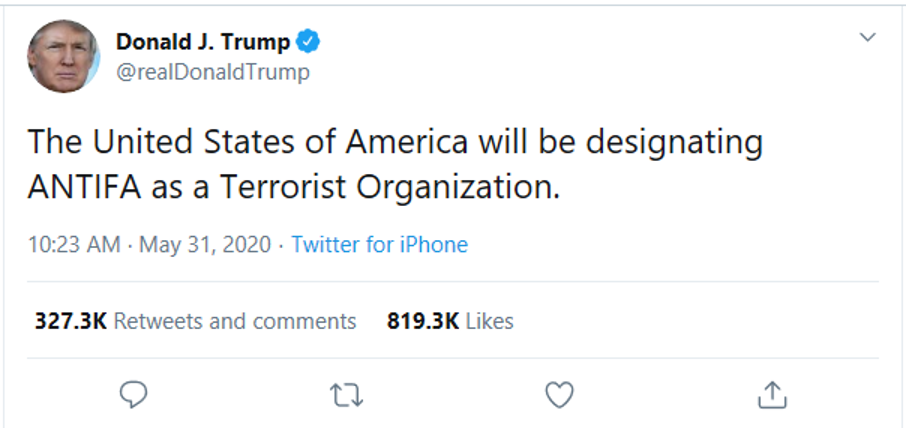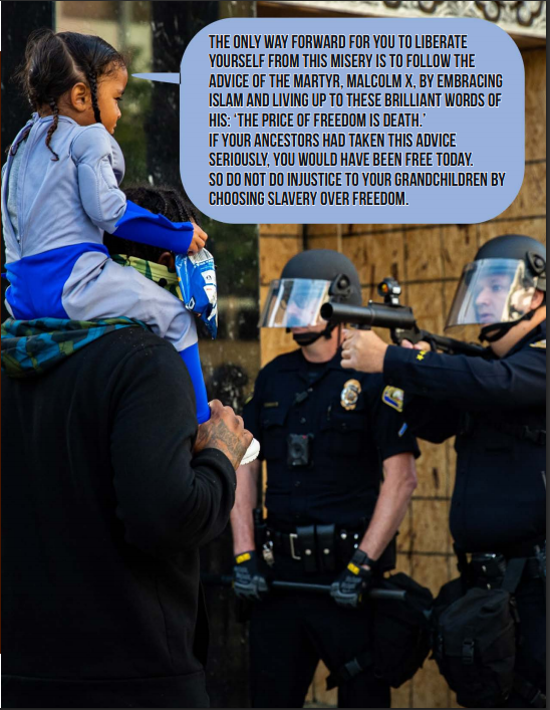There has been significant commentary on violent extremists' intent to exploit this rare moment of uncertainty and instability caused by the global COVID-19 pandemic in developing countries such as Mali and Niger and public demonstrations. The global pandemic, recent protests, and government response to these demonstrations heighten the risk for violent radicalisation that affects the stability of western developed countries—and the United States is not immune. There are clear indicators that domestic violent extremist organisations and movements in the US are interested in exploiting this convergence of longstanding social unrest, systemic racism, grievances, economic disparities, the COVID-19 pandemic, and the most recent wave of widespread protests in the United States related to the murder of George Floyd by Minneapolis Police Officer, Derek Chauvin.
I will argue in this Perspective that international violent extremist organisations view current social unrest as both a moment of weakness and an opportunity. ISIS sees the present moment as an opportunity to take advantage of American distraction to make gains in Muslim majority countries. In contrast, contemporary protest movements in the US and the global COVID-19 pandemic presents al-Qaeda with a chance to highlight American social, economic, and political challenges and recruit.
The Backdrop
On May 25 2020, Minneapolis police officers arrested a 46-year-old black named George Floyd after he allegedly used a counterfeit $20 bill to purchase cigarettes. During the arrest Minneapolis officer, Derek Chauvin restrained George Floyd for 8 minutes with a knee on his neck, while bystanders recorded the incident. The following day, protests began in Minneapolis and quickly spread to at least 140 American cities and several countries over a few days.
The ensuing unrest across the country resulted in a mixture of mostly peaceful protests, rioting and looting, violent clashes, arrests of journalists, allegations of police abuse, and mobilisation of national guard contingents. This led to calls from citizens and elected officials to drastically alter American policing in demands ranging from reallocation of funds to defunding, reform, and even calls to abolish police altogether.
American elected officials accused far-left movements such as antifa of stoking division and inciting violence, ultimately resulting in President Trump declaring “ANTIFA” a terrorist organisation via Twitter.
The president currently lacks statutory authority to formally designate antifascists as terrorists, while the US State Department is responsible for designating foreign terrorist organizations pursuant to the Immigration and Nationality Act. Other officials pointed towards the presence of far-right groups and movements during demonstrations such as members of the Boogaloo movement, who actively participated in marches while armed during anti-lock down demonstrations. Although, the movement is frequently characterized as far-right, anti-government, and accelerationist, some observers have also characterized the movements adherents as racist and neo-Nazi. However, current activity within demonstrations has indicated the complexity of these groups and actors with some Boogaloo bois espousing anti-racism, defying monolithic categorization.
Although a myriad of domestic actors and groups are active, violent international extremists have also turned their attention to social divisions in the US. ISIS and al-Qaeda have produced editorial commentary on the confluence of COVID-19 and American Protest movements.
Violent extremist propaganda: al-Qaeda and ISIS
Both al-Qaeda and ISIS have shown interest in the most recent rise of longstanding and deep-seated social divisions within American society. Al-Qaeda's One Ummah (an al-Qaeda online magazine) editorial, published in June 2020, begins with a foreword focused on widespread protests, COVID-19, and the economic insecurity present in the US. ISIS has also examined these issues in its al-Naba’ newsletter, published on June 4, 2020. According to Aymenn Jawad al-Tamimi, an independent analyst who translated the document, the al-Naba’ editorial argues that the US protests are being treated as a single issue particular to one country. The column argues that the likelihood of unrest spreading to other countries is high due to the pandemic. The editorial states that, ultimately, these mismanaged social issues may have worse effects in other countries while also distracting the US from aiding ‘tyrants and apostates’ in their fight against Muslims and mujahideen.
Before the COVID-19 pandemic and recent protests, the White House discussed decreasing the presence of American military personnel in places such as Africa, where violent extremist groups continue to challenge state authorities. Significant and persistent economic and social instability may weigh on the decision to bring American forces home, especially under the spectre of the 'America first' rhetoric. A decision to withdraw troops and resources from foreign theatres negatively impacts counter-terrorism missions lead by American allies. The al-Naba’ editorial challenges the narrative of American strength by highlighting real concerns while also motivating its followers to continue their efforts.
The One Ummah piece shares similar themes with the al-Naba’ editorial while also going into great detail in its condemnation of the US political system and elected officials. The One Ummah article appears to have many intended audiences, targeting al-Qaeda supporters and black Americans specifically. The article claims that the five corners of America's pentagonal coffin are: corona, internal division, racism, an economy in shambles, and attacks by the mujahideen. The section shows a clear understanding of current societal issues in the US while also arguing that al-Qaeda's fighters will eventually play a significant role in the death of America.
The piece goes on to say that an American implosion also affects the entire western world, which al-Qaeda frequently describes as corrupt and rotten. The commentary simultaneously connects the murder of George Floyd to security force abuses in Egypt and directly compares President Trump's response to that of deceased ex-Libyan President Gadhafi and current Egyptian President al-Sisi. This section shows an awareness of criticisms of President Trump's fondness of dictators and political strongmen. This is a direct critique of rulers in Muslim majority countries that al-Qaeda views as repressive and tyrannical.
The article ends with an extensive condemnation of Democratic presidents Barack Obama, Bill Clinton, and other Democratic leaders such as Joe Biden and Nancy Pelosi. Black Americans are warned against trusting either Republican or Democrats who are depicted as exploitative and self-interested. At the end of the article, a graphic depicts white police officers pointing a less than lethal munition launcher at a black man with his child sitting on his shoulders. The text in the photo states, "the only way forward for you to liberate yourself from this misery is to follow the advice of the martyr, Malcolm X, by embracing Islam and living up to these brilliant words of his:" the price of freedom is death". The text continues to say, "if your ancestors had taken his advice seriously, you would have been free today." The article connects current events to past racial injustices. It uses a bastion of the black freedom struggle as both a model and a reminder of what happens when calls to action go unheard and unanswered. The commentary is repeated in the editorial body, with a clear argument that the solution to the problems of black Americans is through embracing Islam, taking action, and embracing sacrifice.
Photo from “One Ummah”, al-Qaeda magazine
Both pieces highlight common themes: injustice, security force abuses, political corruption, American weakness, and economic and social exclusion. Both pieces also offer similar solutions to these problems: Islam, becoming a mujahid, and martyrdom. The al-Naba editorial, an Arabic language article, appears to challenge America and tyrannical regimes in Muslim countries and to appeal to an audience of Arabic speaking supporters and potential supporters. Conversely, al-Qaeda's English language piece seems to be recruitment material for black Americans and non-Muslims Americans dissatisfied with the conditions within the US and sensitive to the arguments presented in the article.
Conclusion
Conflict dynamics in the US are not always analysed within the same frameworks that are commonly applied to non-Western countries. The social divisions and inequities driving current American protests show that the US is not immune to internal destabilisation. Often, practitioners working within the countering violent extremism and preventing violent extremism fields [in non-Western countries] highlight the significance of grievances, perceived injustice, and security force abuses to radicalisation to violence.
The recent ISIS and al-Qaeda propaganda discussed in this analysis use these themes to facilitate a narrative in which they alone hold the solution to righting these wrongs and provide a pathway to action. Grievances, perceptions of injustice, intergenerational trauma, and present trauma from current events fosters a level of uncertainty ripe for extremist exploitation. Therefore, to ensure that this propaganda does not resonate with its targeted audience in the US, this moment necessitates attention, local and national political efforts to address inequities and divisions, and robust multidisciplinary collaboration. The solution has little to do with the extremist groups themselves and has more to do with America, Americans, and American institutions. If protests continue without sufficient resolution, non-state actors will likely increase their efforts to recruit people and exploit their grievances. A lack of resolution risks an escalation in violence.










